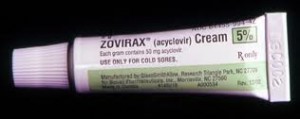What is Acyclovir Topical?
 Acyclovir is an antiviral drug. It slows the growth and spread of the herpes virus so that the body can fight off the infection. Acyclovir will not cure herpes, but it can lessen the symptoms of the infection.
Acyclovir is an antiviral drug. It slows the growth and spread of the herpes virus so that the body can fight off the infection. Acyclovir will not cure herpes, but it can lessen the symptoms of the infection.
Acyclovir topical is used to treat cold sores and genital herpes.
Acyclovir topical may also be used for purposes other than those listed in this medication guide.
What is the most important information I should know about Acyclovir Topical?
Use this medication for the entire length of time prescribed by your doctor. Your symptoms may get better before the infection is completely treated.
Treatment with acyclovir topical should be started as soon as possible after the first appearance of symptoms (such as tingling, burning, blisters).
Wear a glove or a finger cot or use a cotton swab when applying acyclovir topical to avoid spreading the virus to other body parts and to other people.
Avoid getting this medication in your eyes.
Herpes infections are contagious and you can infect other people, even while you are being treated with acyclovir topical. Avoid letting infected areas come into contact with other people. Avoid touching an infected area and then touching your eyes. Wash your hands frequently to prevent passing the infection to others.
What should I discuss with my healthcare provider before taking Acyclovir Topical?
Do not use this medicine if you are allergic to acyclovir or polyethylene glycol (such as Colyte, GlycoLax, CoLytely, MiraLax).
FDA pregnancy category B. This medication is not expected to be harmful to an unborn baby. Tell your doctor if you are pregnant or plan to become pregnant during treatment. Herpes virus can be passed from an infected mother to her baby during childbirth. If you have genital herpes, it is very important to prevent herpes lesions during your pregnancy so that you do not have a genital lesion when your baby is born.
It is not known whether acyclovir topical passes into breast milk or if it could harm a nursing baby. Do not use this medication without telling your doctor if you are breast-feeding a baby.
Acyclovir Topical Side Effects
What are the possible side effects of Acyclovir Topical?
Get emergency medical help if you have any of these signs of an allergic reaction: hives; difficulty breathing; swelling of your face, lips, tongue, or throat.
Less serious side effects are more likely to occur, such as itching, swelling, or pain where the medicine is applied.
Side effects other than those listed here may also occur. Talk to your doctor about any side effect that seems unusual or that is especially bothersome. You may report side effects to FDA at 1-800-FDA-1088.
Acyclovir Topical Interactions
What other drugs affect Acyclovir Topical?
There may be other drugs that can affect acyclovir topical. Tell your doctor about all the prescription and over-the-counter medications you use. This includes vitamins, minerals, herbal products, and drugs prescribed by other doctors. Do not start using a new medication without telling your doctor.
What should I avoid while taking Acyclovir Topical?
Avoid getting this medication in your eyes. If this does happen, rinse with water.
Herpes infections are contagious and you can infect other people, even while you are being treated with acyclovir. Avoid letting infected areas come into contact with other people. Avoid touching an infected area and then touching your eyes. Wash your hands frequently to prevent passing the infection to others.
Acyclovir will not prevent the spread of genital herpes. Avoid sexual intercourse or use a latex condom to prevent spreading the virus to others.
Acyclovir Topical Dosage
How should I take Acyclovir Topical?
Use this medication exactly as it was prescribed for you. Do not use the medication in larger amounts, or use it for longer than recommended by your doctor. Follow the directions on your prescription label.
Treatment with acyclovir topical should be started as soon as possible after the first appearance of symptoms (such as tingling, burning, blisters).
Wear a glove or a finger cot or use a cotton swab when applying acyclovir topical to avoid spreading the virus to other body parts and to other people.
Apply enough acyclovir topical to cover the lesion(s) completely. This medication may be applied every 3 hours up to 6 times daily. Acyclovir topical is usually used for 7 days. Follow your doctor’s instructions.
Use this medication for the entire length of time prescribed by your doctor. Your symptoms may get better before the infection is completely treated.
Lesions caused by herpes viruses should be kept as clean and dry as possible. Wearing loose clothing may help to prevent irritation of the lesions.
Store acyclovir topical at room temperature away from moisture and heat.
What happens if I overdose on Acyclovir Topical?
Seek emergency medical attention if you think you have used too much of this medicine. An overdose of acyclovir topical applied to the skin is not expected to produce life-threatening symptoms.
What happens if I miss a dose of Acyclovir Topical?
Use the medication as soon as you remember. If it is almost time for the next dose, skip the missed dose and use the medicine at the next regularly scheduled time. Do not use extra medicine to make up the missed dose.
Edited from everydayhealth.com
